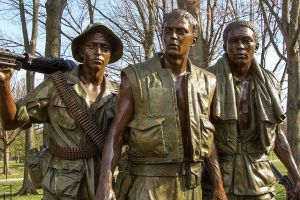 Hi Friend,
Hi Friend,
War changes one’s perception of life. For those of us who grew up during the years following the Korean War and then watched close friends and family members accept military assignments during the Vietnam War, it was sobering.
Getting an appointment to West Point was not easy. It wasn’t like driving up to a hotel and checking in at the front desk. The academies took the best, the brightest, the healthiest and most dedicated. And even that wasn’t enough—it required a recommendation from your state Congressman.
When young men came out of military school or ROTC (Reserved Officer Training) at college they received the rank of 1st Lieutenant and were sent off to fight. The 1st Lieutenant led his men to face the enemy in combat. Often he was the first to die—a virtual sacrifice on the field of combat.
It puzzled me to see a class leader, sports star or men of a pure heart offered in such a way. Why would a country send it’s “best” to be sacrificed?
That thought was in the back of my mind once while reading what God requires of a sacrifice. The scriptures are clear that God wants the best! He calls for the “first” fruits—the first born to be dedicated to the temple service, the first lamb that opened the womb to be sacrificed on the Holy Day. Blemished sacrifices were not acceptable. No priest would accept as an offering a cancerous cow or a sheep that was crippled or diseased.
When Nehemiah rebuilt Jerusalem he gathered the people together and they made a covenant with God to give the best for the temple. Nehemiah writes, “And we made ordinances to bring the firstfruits of our ground and the firstfruits of all fruit of all trees, year by year, to the house of the Lord; to bring the firstborn of our sons and our cattle, as it is written in the Law, and the firstborn of our herds and our flocks, to the house of our God, to the priests who minister in the house of our God;” (Nehemiah 10:35-36).
The picture that emerges from the Bible is not that a sacrificial animal is of lesser value—only the best of animals were worthy of such a thing.
When Noah got off the Ark, one of the first things he did was to offer a thanksgiving sacrifice to God for saving him. But notice—some animals were not worthy to be offered to God. Only the “clean” animals could be brought. To offer a pig was an offense to God.
Why this stipulation?
Maybe it was because THE sacrifice that would be offered for the life of all mankind was clean. Jesus was perfect. He was unblemished. Nothing else was worthy. Nothing else could satisfy the moral demand of atoning for sin.
Furthermore, the Father gave the best possible offering for the life of man—His firstborn Son! No unclean animal could be used to represent this gift.
Paul tells us that Jesus was the Firstfruit of many. “But now Christ is risen from the dead, and has become the firstfruits of those who have [d]fallen asleep.” (1 Cor. 15:20) The symbolism is overwhelming. Every time an unblemished first born of the flock was offered at the temple, the being that would later empty himself of divine authority and be born as a human, knew it represented HIS sacrifice.
One more thing: when Paul refers to Christians he addresses us as firstfruits. Writing to the church at Rome he said, “But we ourselves, who have the firstfruits of the Spirit,” (Romans 8:23).
When you “lay down your life” for your brother, or sacrifice personal feelings for others—or do any of those acts required of Christians, remember that you are the worthy sacrifice.
Until next time,
Jim O’Brien
